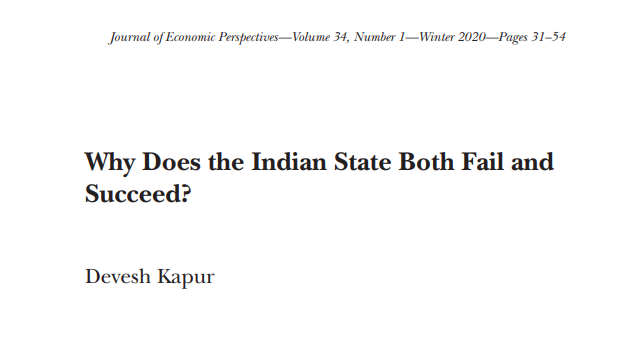How the government and businesses can come together to protect the human capital in the #COVID19 crisis? Less than an hour to go! Do watch the final webinar of #LeaderswithPurpose series at 5 PM IST today. @Samhitadotorg
Rajiv Lall discusses with @jamescrabtree how this crisis presents a moment of truth for India. The vocabulary of the 90s, “big state”, “small state”, "private better than public” are outdated notions, what matters is the capacity of the state to deliver essential services (1/n)
What matters now is the capacity of the state to deliver essential services and presenting a reliable framework for private sector to operate. (2/n)
The broad direction of government intervention has been on the right lines and the size of the response (10% of GDP) is the right order of magnitude, cautionary and fiscally responsible. (3/n)
In response to @jamescrabtree 's question about labour market support measures, Rajiv Lall presents three ideas : 1) Support to formal sector not unlike developed country measures (delaying PF contributions, encouraging workforce retention etc) (4/n)
2) Support informal sector : RBI must support banks and NBFCs to lend to MSMEs and guarantee their lending, which will have a multiplier effect (5/n)
3) Directly support workers through cash transfers and other forms of assistance that are already components of national and state relief packages (6/n)
Employment intensity of GDP growth has been declining, for every 100Rs of GDP growth, the employment created is very low. Therefore the employment challenge is key as the cleavage between formal and informal sector will be accentuated by this crisis (7/n)
"India does not have a crisis of capability... the bureaucracy at all levels has much greater capacity than other emerging markets". We need to redeploy this existing state capacity into sectors such as public health says Rajiv Lall, Chairman of our Advisory Board. (8/n)
Short-termism in the private sector has to change. To some extent, this will come from investors who demand more responsibility from the companies, but it must also come intrinsically from businesses who seek to be more responsible producers and employers. (9/n)
We will see a protracted contraction of demand and significant job loss even in the organised sector, predicts Punit Lalbhai, ArvindLtd. Suggests the adoption of creative measures of retaining workforce by tapping emerging manufacturing opportunities like medical textiles (10/n)
Tune in at , a webinar on "Protecting human capital to emerge from the crisis", co-organised with @Samhitadotorg and moderated by @jamescrabtree (11/n)
App to accept orders & deliver services was also used as a medium to forward Rs 11 crores of loans to their micro-entrepreneur partners, describes @AbhirajB, Urban Company as he lists the various measures put in place by the company to protect its partners and employees. (12/n)
"Important to start imaging a new paradigm for the gig economy inclusive of social security and flexibility for workers" @abhirajbhal, Urban Company (13/n)
With evaporation of livelihoods and capital, there is an immediate need for sustenance and reversion to the workforce. There is a freezing of liquidity in the MSME sector because of high risk aversion, describes
@rahil_r, Michael and Susan Dell Foundation (14/n)
@rahil_r, Michael and Susan Dell Foundation (14/n)
@rahil_r, MSDF on reaching the target audience, "It is critical to find the technologies and FinTech partners to leverage their platforms to reach the informal sector and administer the capital at low transaction costs". (15/n)
• • •
Missing some Tweet in this thread? You can try to
force a refresh








